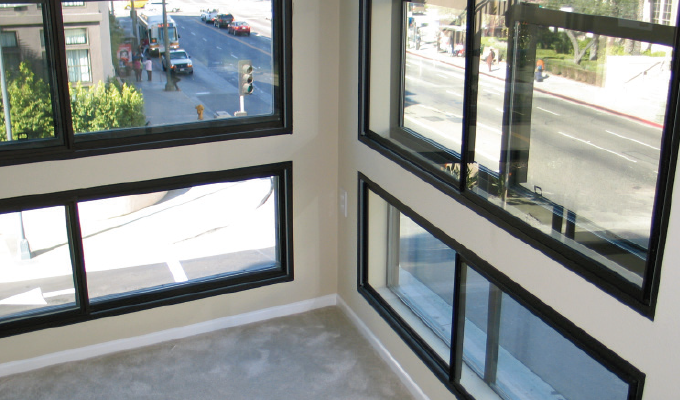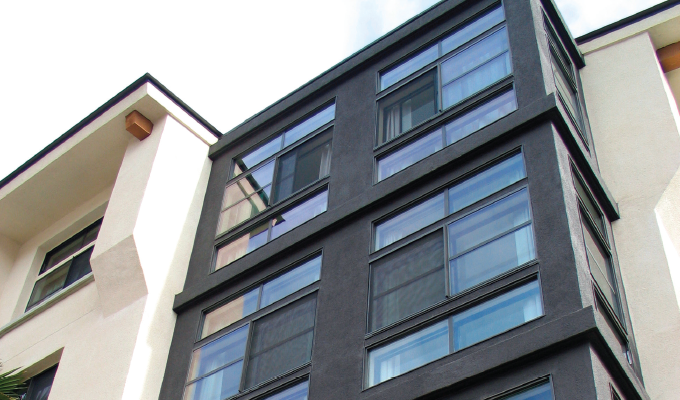Commercial and residential property owners, managers, and agents of urban apartment buildings face a common concern in reducing loud external environmental noise, such as screeching traffic, blaring car horns, etc., which can disturb sleep, interrupt conversation, and otherwise diminish the allure of even the best locations.
Fortunately, real estate professionals in large and small projects alike are implementing a quick, proven, cost-effective solution which can dramatically reduce external noise intrusion by up to 95 percent with the addition of a second soundproof window in the most problematic locations (i.e., facing traffic). This selective approach can help to not only increase lease and occupancy rates but also decrease turnover. The same tactic can be applied to both oversized windows and sliding glass doors, which due to their larger size can be an even greater source of external noise.
CUT NOISE, BOOST APPEAL
When Lincoln Properties developed the multi-million-dollar Mozaic Apartment project, the goal was to bring a designer lifestyle to downtown Los Angeles apartment living. From the roof top pool to the Internet cafe, Mozaic Apartments set the standard in a luxury apartment community.
However, being in the middle of downtown Los Angeles also subjected the property to an incredible amount of external street noise. Even given the high-end amenities, the amount of outside noise could be prohibitive and turn off potential tenants without adding soundproofing. Particularly challenging were the units which had oversized, floor-to-ceiling windows.
With lease rates in the downtown area commanding upwards of $3,000 per month, not having a 100-percent occupancy rate could be expensive. Lincoln Properties, the developer of the project, decided the best soundproofing tactic would be to exceed the government noise abatement requirements to help attract prospective residents.
“We wanted to provide a high quality of life to our tenants and we felt that included a quiet environment,” said the project manager for Lincoln Properties, Sasha Cooper. “To exceed the Los Angeles requirements by soundproofing and be noticeably quieter than our competition, we set some tough noise reduction targets.”
THE CHALLENGE
Lincoln Properties hired an acoustic consulting firm, Veneklasen Associates, to do a detailed site survey and review as well as extensive sound testing to evaluate the noise levels.
Multiple studies have shown that 90 percent of exterior noise enters through windows, and for similar reasons conversations can just as easily exit through them as well. Such noise intrusion can be a particular problem for both commercial and residential properties located near outside street noise, transport corridors, or city centers.
Initially, high quality double pane windows were installed and tested, but these turned out to fall short of their target. Double pane replacement windows are designed to keep out heat and cold, but not noise. While the seals of a new window provide some noise reduction, the two pieces of glass in double pane windows are separated by an air space, and sealed into one solid glass unit. Like a drum, this causes both pieces of glass to vibrate together. This drum effect defeats the noise reduction benefit of double pane windows.

THE SOLUTION
After doing online research in search of a solution, Cooper turned to Soundproof Windows, Inc., a company with expertise engineering windows for some of the most noise sensitive environments in the world, such as recording studios.
The company has adapted recording studio window soundproofing technology for commercial and residential properties by creating a secondary soundproofing window that installs inside, behind the existing window. The product is custom designed specifically to match—and function—like the original window. Installation is simple, straightforward, and usually can be completed in about an hour or two.
The inner window essentially reduces noise from entering on three fronts: the type of materials used to make the pane, the ideal air space between original window and insert, and finally improved, long-lasting seals. The combination can reduce external noise by up to 95 percent.
The first noise barrier is laminated glass, which dampens sound vibration much like a finger on a wine glass stops it from ringing when struck. An inner PVB layer of plastic further dampens sound vibrations.
Air space of 2-4 inches between the existing window and the Soundproof Window also significantly improves noise reduction because it isolates the window frame from external sound vibrations.
Finally, the company places spring-loaded seals in the second window frame. This puts a constant squeeze on the glass panels, which prevents sound leaks and helps to stop noise from vibrating through the glass. These spring-loaded seals stay as acoustically sound 15 years down the road as they were on day one.
EXCEEDING EXPECTATIONS
For Lincoln Properties’ Mozaic Apartment project, the next step was to install Soundproof Windows in several of the nosiest units and perform more sound tests to evaluate the soundproofing results.
The soundproofing surpassed their expectations and noise reduction goals in every room tested. The result even amazed John LoVerde, the associate principal consultant from Veneklasen. “I had heard of Soundproof Windows previously and was impressed after testing their installed product.”
“The windows exceeded our requirements for soundproofing. Now, despite all the downtown city noises outside, all our units have a very quiet and less stressful living environment,” explains Cooper.
In regard to the apartments with oversized floor-to-ceiling windows, Cooper says, “We didn’t expect to see as much difference in the level of noise because of the number and size of the windows. But we were quite surprised and pleased with the results.”
Another positive aspect of these soundproofing windows is how well they fit in with the decor. Looking at a room, the occupant would not know that a powerful STC 54 rated Soundproof Window had been installed.
When choosing soundproofed windows, the most objective measure of sound reduction is the window’s Sound Transmission Class (STC) rating. In this rating system, the higher the number the more noise is stopped. A typical rating for standard windows is 26 to 28, for example. The acoustic soundproof windows, by comparison, earn a 48 to 54 STC rating.
CLOSING THOUGHT
Whether commercial or residential property managers seek to enhance occupancy or rental rates by protecting their renters and tenants from stressful external noise intrusion, economically soundproofing existing windows can provide a real competitive edge.
for more information:
For more about Soundproof Windows, Inc., visit www.soundproofwindows.com.
Modern Contractor Solutions, January 2021
Did you enjoy this article?
Subscribe to the FREE Digital Edition of Modern Contractor Solutions magazine.



